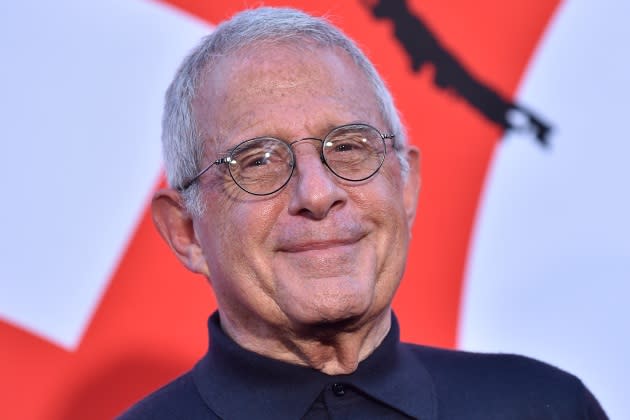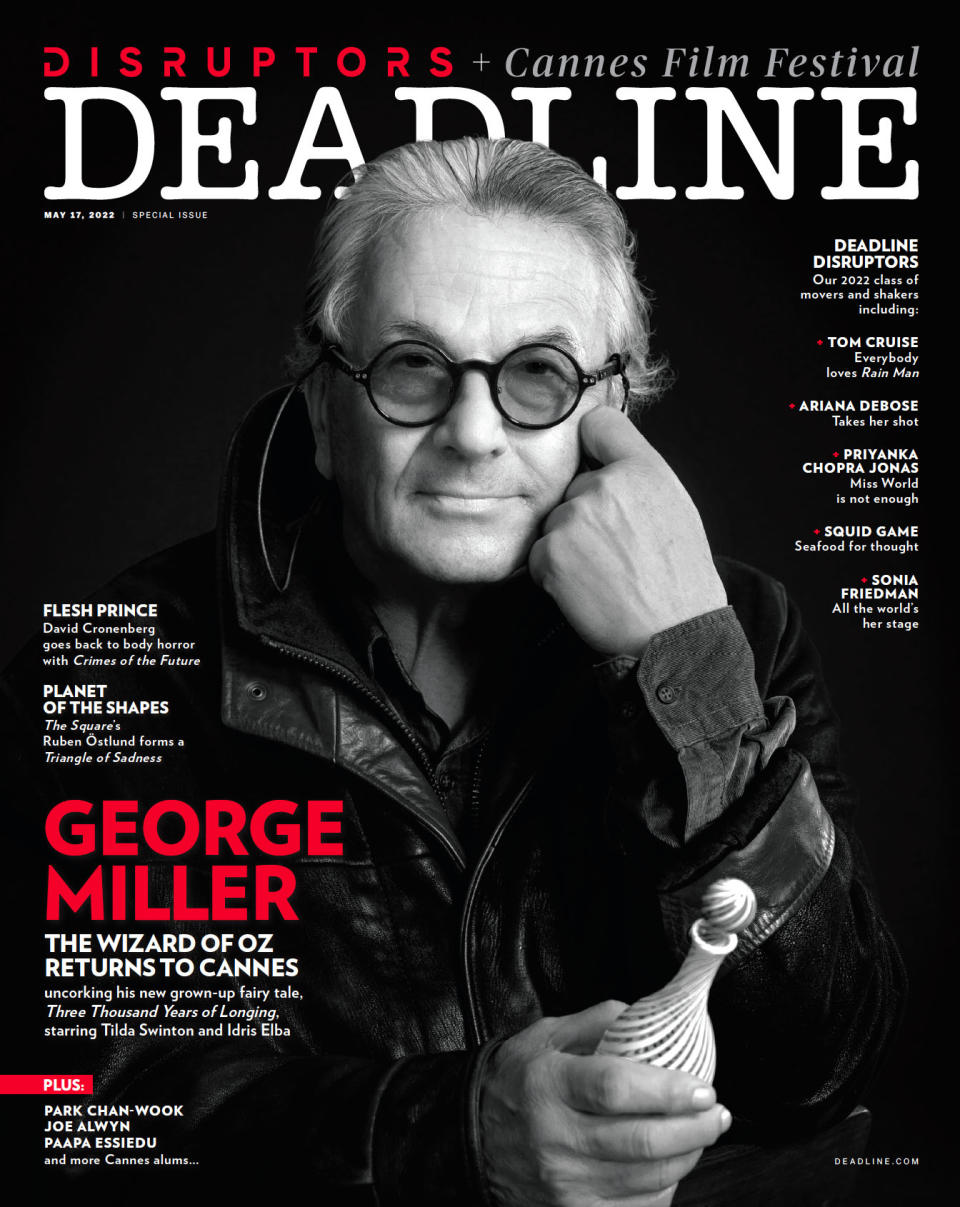Ron Meyer, Sophie Jordan Leading A Wave Of Change At French Indie Powerhouse Wild Bunch — Deadline Disruptors

In a surprise move last November, veteran studio chief and CAA co-founder Ron Meyer and former beIN Media Group executive Sophie Jordan were named CEO and co-CEO of European indie powerhouse Wild Bunch AG. Together, the formidable leadership team will help steer the pan-European film, TV and media company into the next era of expansion.

More from Deadline
It’s an interesting turn of events for Wild Bunch, which was originally founded by former StudioCanal executives in 1999 and spun off as a separate entity in 2002. It has consistently been at the forefront of the global indie film movement with strong ties to the Cannes Film Festival, having backed at least six Palme d’Or winners.
In 2015, it became a subsidiary of Germany’s Senator, which then rebranded as Wild Bunch AG. In 2019, it formed a standalone sales division, Wild Bunch International, overseen by Wild Bunch co-founder Vincent Maraval, someone with whom the company has long been synonymous (but who we have also heard has been mulling a rebrand). Wild Bunch manages a library of more than 2,500 titles and has positioned itself as a key player in direct electronic distribution via its VOD/SVOD service FilmoTV.
The company has had a turbulent run in recent years, with multiple refinancings including a €35 million credit line from Commerzbank in 2020. Today, Meyer says, “We have the funding to do what we need to do,” with a portion from global investment house Tennor Group and other “outside sources”. There are no plans to take the company public as of now.

Wild Bunch
In a 25-year run at NBCUniversal, Meyer guided the media conglomerate through the transition of six different ownerships. Jordan’s international expertise includes runs as an executive and board member at leading companies like Canal Plus, beIN Media Group, Digiturk, Miramax, Paris Saint Germain and Qatar Sports Investments.
DEADLINE: Can you describe how this partnership, and taking over Wild Bunch, came about?
RON MEYER: I’ve been consulting to the Qatari royal family for the past year-and-a-half about their possibility of being in the movie business, and I’ll speak for Sophie who, for the past 19 years, has really been overseeing beIN Sports, which encompassed Miramax and the Paris Saint-Germain soccer team. In my many meetings with the Qataris, many of them Sophie had been in. I think we liked each other, and I was always hugely impressed with her knowledge and ability. She’s a lawyer, although she wasn’t necessarily practicing law, but I was always very impressed by her and we had a good relationship.
We were approached by a man, Lars Windhorst [CEO of investment house Tennor Group], who at that time was the majority owner of Wild Bunch and really presented us with a kind of irresistible opportunity to take the company over and grow it. So, Sophie and I spent a good deal of time talking about the company, what we could do with it and how we would do it, and we both decided that we would do this together.
DEADLINE: What are you looking to do in terms of production, distribution, potential acquisitions, and expansion?
SOPHIE JORDAN: In general, we have the ambition to position Wild Bunch as an international independent producer of local content, leveraging our strength from our historical subsidiaries in Spain, France, Germany and Italy; and also expanding in other territories, in particular the U.K. and United States.
MEYER: We see an opportunity to really be the first worldwide independent production/distribution company. We already have the base in those territories. We have the funding to make the acquisitions and investment in companies that help us get there. But we’re meeting with people now and having discussions and really trying to target the companies that we would like to pursue and the companies that would like to be pursued by us.
DEADLINE: Vincent Maraval has been an integral part of Wild Bunch since its inception; how does his Wild Bunch International dovetail with your plans?
JORDAN: We came into an existing situation. The idea is that Vincent Maraval is obviously an important element of the history of Wild Bunch and still at Wild Bunch International today, and we’re taking that into consideration. I mean, we love Vincent, we like working with him and we want to continue doing that in whatever form that may take.
MEYER: The one thing that is clear is that everything that we do will stay in-house. Obviously, we plan on continuing our relationship with Vincent Maraval, but all of what we do will stay within Wild Bunch. We haven’t figured out whether Vincent Maraval changes the name of his company, but we intend to continue a relationship with him; it just may change.
DEADLINE: Wild Bunch at its inception was a maverick company and grew to become iconic within the film industry, and specifically the French industry. It’s rare to have an American at the head of an entity like this. What has the reaction been?
JORDAN: There’s nothing other than goodwill in the French media or film industry. Everyone wants to see Wild Bunch succeed because it’s a much beloved brand. And, on the contrary, having the influx of Ron’s industry knowledge and relationship is seen as a great advantage.
MEYER: If I didn’t have Sophie as a partner, it would be out of the question that I could do this. She’s on the ground in France really running the company on a daily basis. I’m here in the U.S., although I come to Paris at least once a month, but my focus is really on growing the company in the United States, and ultimately all of what we do will become one company. My background, my knowledge is more U.S.-centric than international, so I think Sophie and I, a lot of what makes us work and will make it work is that we share that mutual knowledge of various regions.
DEADLINE: Within the company, are you planning to make big structural changes?
JORDAN: I think it’s a little early to answer that. There’s always changes when new people come on, but we’re not contemplating any immediate huge changes either in staff or structuring.
On the contrary, we really need to rely on the historical Wild Bunch. And going back to your Disruptors edition, this is what really, I think is the interesting part of what we’re trying to build here: the synergies between what we can leverage in the actual European talent and then the U.S., U.K. production and distribution part of it.
Also, the company was kind of stalled for the past three or four years, so they haven’t been doing that much in terms of production. They didn’t actually take that kind of pivot eight or 10 years ago when they probably should have. There are not really any changes to be made in that area because that area doesn’t have strong existence yet. It’s rather building up on what we have than making changes.
DEADLINE: Sophie mentioned local content. Does that mean you will make German films for Germany, French films for France, et cetera?
MEYER: For the company to grow, we have to be out of just the local production. You know, we still want to continue local production, but we have to be in films that really travel around the world, and we’re the new kids on the block so a lot of people are showing up with a lot of ideas for us. We haven’t decided what, when and how we’ll go forward, but there are a lot of opportunities, we’ve just got to decide what we want to do and when we want to do it.
DEADLINE: When do you anticipate your first big moves?
MEYER: We’re out looking for the right strategic acquisitions or investments and we have those opportunities. We’re just deciding which ones make the most sense for us, and frankly, that the ones that we want, want to do it with us… We’re probably a number of months away from making any significant announcement. We’d like not to make a lot of little piecemeal announcements. When we have a complete picture to announce we’d like to do that.
DEADLINE: You’re entering the independent business at a time when the theatrical model for a certain level of film—pandemic or not—is facing difficulty. What are the biggest challenges and advantages to setting off amid the current landscape?

MEYER: There’s no mystery. I think traditional distribution has changed a lot and a lot of films are going to go to the streamers first or be made for the streamers. So, I think you have to pay attention to what’s going on out there. For content providers, which obviously we will be, I think it’s a great time—it’s a better time than it’s ever been, it’s a little bit of a gold rush. So, if you’re making content and you’re in kind of a great position, the question is where do you sell it? Do you distribute it in traditional theatrical form? Do you sell it to a streamer? Do you put it in the theaters for a short period of time and then go to the streamer?
There are a lot of options, and each film must be evaluated on its own merit and what you decide to do with it, but I think there’s more opportunity than ever.
I am bullish and optimistic about the future of the movie business, where some people are painting doom and gloom. I don’t think people are going back to the theaters in the most traditional way, but they are going back in a way that the right films can make money in the theaters, and otherwise there’s a great business in making films for streamers and television.
Best of Deadline
2022-23 Awards Season Calendar - Dates For The Oscars, Emmys, Tonys, Guilds & More
NFL 2022 Schedule: Primetime TV Games, Thanksgiving Menu, Christmas Tripleheader & More
Sign up for Deadline's Newsletter. For the latest news, follow us on Facebook, Twitter, and Instagram.

